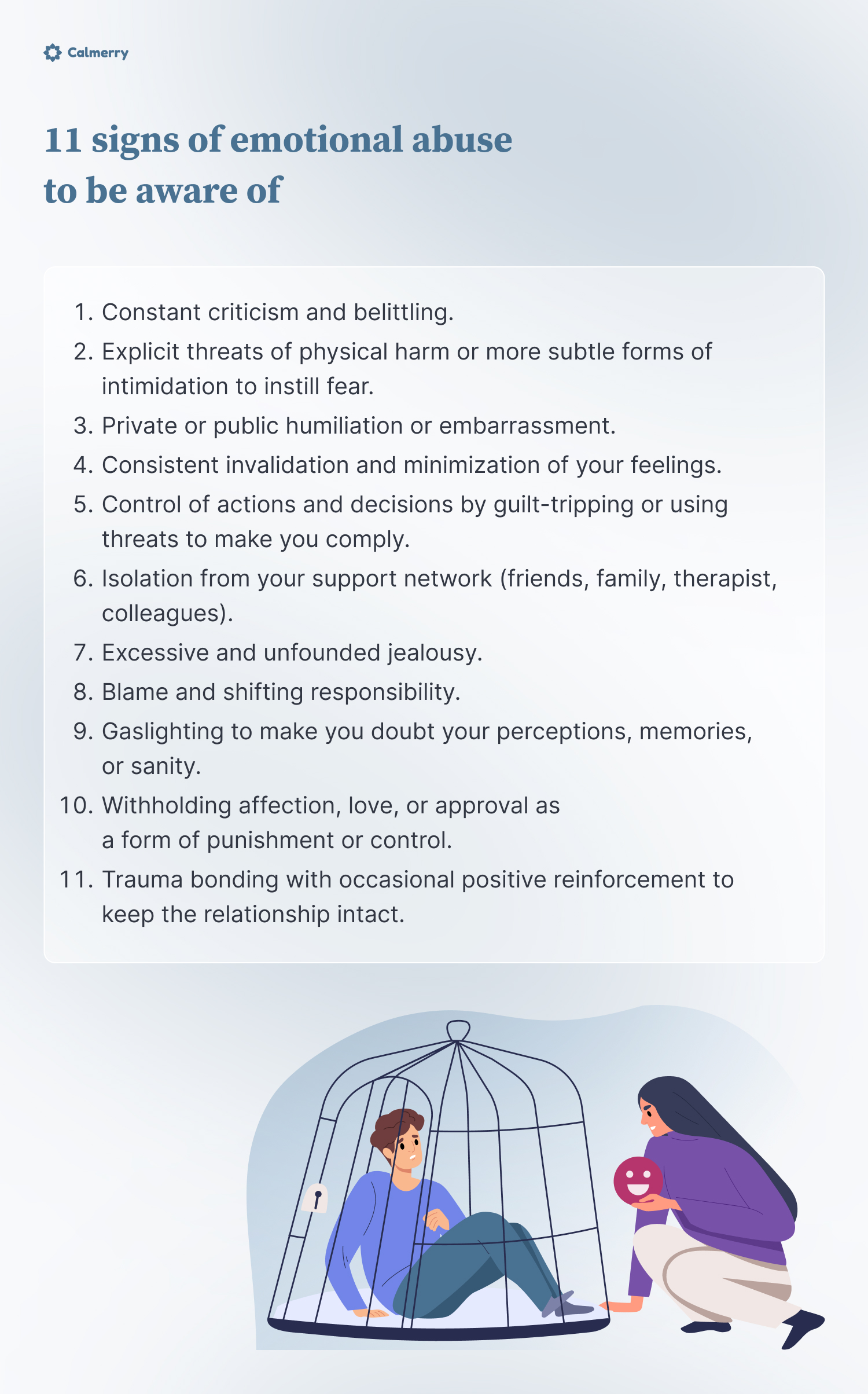Emotional Abuse Checklist: 11 Signs to Be Aware of in a Romantic Relationship

In this article
Emotional abuse is serious and potentially traumatizing in a romantic relationship.
According to the National Intimate Partner and Sexual Violence Survey summary report from 2016/2017, approximately 50% of Americans had experienced emotional abuse from an intimate partner. It’s a sobering statistic.
It’s essential to recognize signs of emotional abuse early on and seek help if you find yourself in an emotionally abusive relationship.
If you are in immediate danger, don’t hesitate to contact local authorities or a domestic violence hotline.
If you find yourself in a situation where your gut tells you something in your relationship is problematic, tune in and listen. Your intuition may be trying to guide you, but you’re unsure how to proceed safely.
Fortunately, there are many resources available to help someone who may be experiencing emotional abuse in a relationship.
What is emotional abuse?
Emotional abuse is defined as any non-physical behavior intended to manipulate, control, or diminish another person’s self-worth. These behaviors may include name-calling or other verbal abuse, making threats, or attempts by the abusive person to manipulate the actions of their victim.
Studies show that emotional abuse over the long term can lead to health problems, such as chronic pain, substance abuse, and mental health disorders, such as anxiety and depression. [1] Karakurt, G., Silver, K. E. (2013). Emotional abuse in intimate relationships: The role of gender and age. https://connect.springerpub.com/content/sgrvv/28/5/804
It is common for a person in an abusive situation to develop insecurities about their identity, with a notable decrease in their sense of self.
Additional examples of emotional abuse:
- Constant monitoring of your whereabouts and who you spend time with
- Humiliation
- Excessive jealousy
- Dismissiveness
The following emotional abuse checklist can serve as a tool for self-reflection when considering your feelings about your romantic relationship.
Perhaps you’ve had some concerns and want clarity on what your gut is trying to tell you. Or, maybe, you seek some validation for the abuse you experienced.
Either way, you want to develop awareness for signs of emotional abuse. You deserve to feel healthy and happy in a relationship and move toward healing.
Emotional abuse checklist: 11 signs to consider
Sometimes, emotional abuse is more apparent, like a partner yelling at you or calling you names. Other times, it can be less obvious, like your partner acting jealous of your friends or not wanting you to hang out with someone of another gender.
While these emotionally abusive behaviors do not leave physical marks, they cause the victim to feel disempowered and potentially experience trauma.
Signs of emotional abuse can also be less overt and more subtle but still very serious and damaging to experience.
– Rychel Johnson, M.S., Licensed Clinical Professional Counselor (LCPC)

The following checklist can help you sort out whether you have experienced emotional abuse in a relationship:
- Constant criticism. If your partner consistently criticizes you, belittles you, or puts you down, it may be a sign of emotional abuse. Critical comments can erode your self-esteem over time.
- Threats and intimidation. This type of behavior may include explicit threats of physical harm or more subtle forms of intimidation meant to instill fear.
- Humiliation and embarrassment. Publicly humiliating or embarrassing a partner, whether in private or in front of others, is a form of emotional abuse that can damage self-esteem.
- Invalidation. An emotionally abusive partner may consistently invalidate your feelings, minimizing your emotions and making you feel like your concerns are not valid.
- Control and manipulation. An emotionally abusive partner may try to control your actions, decisions, and interactions. Control may look like guilt-tripping or using threats to make you comply.
- Isolation. Abusers often try to isolate their victims from friends and family. They may discourage you from spending time with loved ones or intentionally create distance between you and your support network.
- Excessive jealousy. While some jealousy is normal in relationships, excessive and unfounded jealousy can signify emotional abuse. Signs of jealousy are repeated accusations, monitoring your whereabouts, or exhibiting controlling behavior.
- Blame and shifting responsibility. Emotional abusers often refuse to take responsibility for their actions and instead blame their partner for any issues or problems in the relationship.
- Gaslighting. Gaslighting is a form of manipulation where the abuser makes you doubt your perceptions, memories, or sanity. They may deny things they’ve said or done, causing you to question your reality.
- Withholding affection. Emotional abusers may withhold love, affection, or approval as a form of punishment or control. Withholding affection is manipulative and often creates a cycle where the victim feels the need to seek the abuser’s approval constantly.
- Trauma bonding. In the context of an emotionally abusive relationship, a bond can form between the abuser and the recipient of the abuse. Despite abuse occurring, occasional positive reinforcement from the abuser can keep the relationship intact.
Seeking professional help
Noticing that your current or past relationship involved less-than-healthy elements can be an essential first step in improving your quality of life. Admitting that issues exist can be half the battle.
However, the question of what to do next can cause stress.
Do you end an existing relationship? Continue it and ignore red flags? How do you address a relationship that ended months or even years ago?
If you recognize signs in your current or past relationship that cause alarm bells for you, emotional or relationship abuse may have been part of your experience. You could benefit immensely from receiving professional guidance to sort through the feelings that this new awareness has brought to the surface.
– Rychel Johnson, M.S., Licensed Clinical Professional Counselor (LCPC)
Emotional abuse therapy can be essential to processing emotions and moving forward toward healing. While emotionally abusive behaviors may not cause physical harm, they are not characteristic of healthy relationships, and long-lasting trauma can occur.
An emotionally abusive relationship can take a serious toll on the well-being of people who experience emotional abuse and lead to ongoing psychological issues.
If you need a safe space to heal and process your experiences and feelings – Calmerry has available therapists ready to support you and help you cope. We can match you with one of them within 1 hour.
Additional resources for support
At times, you may need immediate support or direction when you’ve experienced emotional abuse. Plenty of resources are available online and in your local region should you need assistance.
Domestic abuse hotlines
- The Domestic Violence Support Hotline is available 24/7 for immediate confidential support. Emotional abuse victims can access care here with the ability to call, chat online, or text a trained hotline operator. More information about emotional abuse and domestic violence can be found on the Domestic Violence Support website.
- Another resource is the Crisis Text Line, where individuals may reach a trained hotline operator for help, which is available 24/7. This website has extensive resources for individuals to read to learn more about emotional and other types of abuse.
Organizations for emotional abuse awareness
- The Center for Relationship Abuse Awareness is an organization that raises awareness about the nature of abusive relationships. This resource offers links to local and regional resources and sources of support in communities.
- The National Coalition Against Domestic Violence (NCADV) is another resource with information for domestic violence survivors and their loved ones.
Support groups
Support groups are likely available in your area.
- One place to search for a local support group is through Meetup, where people can seek out various groups for interests and socialization, in addition to support for abusive relationships. Sometimes, knowing that you are not alone is validating.
- Help Within Reach is an organization offering virtual support groups for survivors of narcissistic and emotional abuse.
Takeaway
Ongoing emotional or psychological abuse, especially when severe, can cause self-doubt and a loss of self-worth. In other words, decreased self-esteem could cause an abuse victim to believe they are not worthy of leaving this relationship or having a healthier one.
Mental health therapy offers support different from family relationships and friendships: therapists and counselors have specialized training unique to your experience and can help you assess your relationship concerns. Having another set of ears and eyes on your problems is valuable.
Addressing emotional abuse from a romantic relationship is challenging and often requires seeking dependable professional help.
Individual counseling and online therapy, domestic abuse hotlines, and support groups for people in similar situations can offer the support you need as you sort through your next steps.
You deserve to experience clarity and healing, as well as a healthy and loving romantic relationship.
Karakurt, G., Silver, K. E. (2013). Emotional abuse in intimate relationships: The role of gender and age. https://connect.springerpub.com/content/sgrvv/28/5/804
online therapy
live video session



